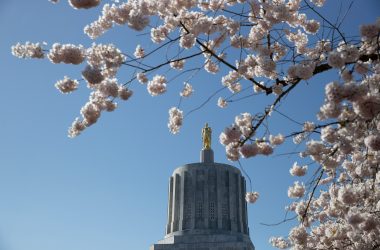
A political fight over the way Oregon manages its forests and timber activity could play out before voters next fall.
Two separate sets of ballot initiatives with contrary views of forestry in Oregon have been filed with the state Elections Division. One side seeks to insulate current practices from change and the other aims to create new regulations that prohibit certain techniques they feel are harmful to the environment and Oregonians.
This week, Jim James and his fellow chief petitioners filed initiatives they’re calling the “Health Forests and Wildfire Reduction Plan.” They would keep the regulation of forest and timber practices on all state and privately-owned lands in the hands of professional foresters, scientists and the Oregon Board of Forestry.
The plan would require the state Forestry Department to report new forestry regulations to the state board for review. The measures would add four members to the board representing scientific forestry fields and timber interests. The package would also amend Oregon’s constitution to the state to compensate landowner if state actions reduce property values.
[ Help build Salem Reporter and local news – SUBSCRIBE ]
James is a professional forester based out of Foster and the executive director of the Oregon Small Woodlands Association, a lobbying group that advocates for private forest owners. The initiatives he’s promoting were filed in response to a set of prospective measures called the “Oregon Forest Waters Protection” package.
“I believe that our forests are at a huge risk from the ballot measures proposed by radical, anti-forestry activists. We need these petitions to be successful in continuing to protect our management of forests,” he said.
The opposing initiatives were re-filed at the beginning of October by Kate Crump, a resident of Rockaway Beach, and two other petitioners after their original package was rejected for violating the initiative process.
One goal of Crump’s initiative package is to prohibit aerial spraying of pesticides on a forest clear cut within 500 feet of rivers and streams, especially those that feed watersheds used for potable water. It would also greatly reduce the logging operations in proximity to water bodies.
Crump said the Oregon Forest Practices Act has been enforced for too long with little change, especially relating to watersheds that supply potable water systems. She believes the ballot is the best way to achieve her goal because people are concerned about protecting their drinking water.
“We’ve had a ton of support, and I think people are really concerned,” she said.
“This is something that’s been on the minds of many coastal residents and Oregonians across the state.”
Each campaign submitted three proposed ballot measures to the state. Once the language is approved, it would need 1,000 voter signatures to receive a ballot title from the state attorney general and await public comment on the title language.
If there are no challenges to ballot title, they will launch full-blown signature gathering to put the measures on the November 2020 ballot. They need 112,020 signatures to change state law and 149,360 for constitutional amendments.
James is motivated in part by the explosion of major wildfires that Oregon and other western states have seen in recent years. He believes active forest management — including harvesting, stand improvement and thinning — are crucial to mitigating wildfires.
“Everyone knows that unmanaged forests are more prone to catastrophic wildfires. The last thing Oregonians need are more wildfires on our landscape,” he said. “It impacts the entire citizenship of our state, and I believe these petitions will help the ability to manage forests in a way that prevents forest fire.”
According to the Northwest Interagency Coordination Center, roughly 80 percent of acres burned by wildfire in Oregon in the past decade were on unmanaged federal lands. Specifically, James and his fellow petitioners are hoping to protect the rights of private property owners to clear cut and use certain herbicides targeting invasive species which allow replanted trees to grow into new, healthy forests.
Gallatin Public Affairs, a political communications and strategy firm with offices in Portland, was hired to run the campaign promoting the Healthy Forests and Wildfire Reduction package. Campaign manager Sara Duncan said Wednesday the signature gathering process to gain the 1,000 sponsor signatures needed to qualify for the ballot titling process is now underway.
On Oct. 29, Crump and her group submitted 3,608 signatures in favor of their three initiatives and received draft ballot titles. The public comment on the draft titles will remain open until Nov. 20.
Contact Reporter Sam Stites: [email protected] or 971-255-2480.









